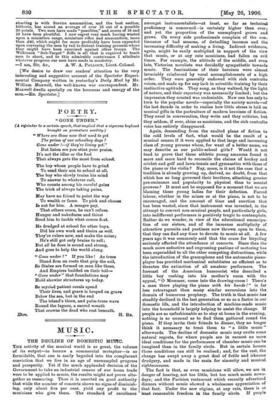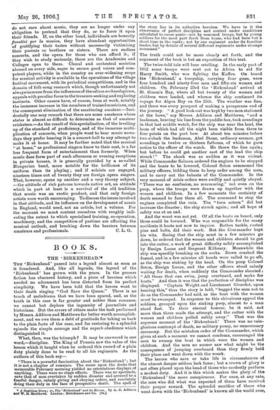M USIC.
THE DECLINE OF DOMESTIC MUSIC.
THE activity of the musical world is so great, the volume of its output—to borrow a commercial metaphor—is so formidable, that one is easily beguiled into the complacent conviction that we live in an age of unexampled progress and prosperity. Yet if the much applauded decision of the Government to take an industrial census of our home trade were to be applied to music, the results might not prove alto- gether so reassuring. Thus it is asserted on good authority that while the number of concerts shows no signs of diminish- ing, only about five per cent. yield any profit to the musicians who give them. The standard of excellence
amongst instrumentalists—at least, so far as technical proficiency is concerned—is certainly higher than ever; and yet the proportion of the unemployed grows and grows. On every side professionals complain of the con. tinuance of bad seasons, of dwindling incomes and the increasing difficulty of making a living. Indirect evidences,
again, might be easily multiplied in support of the view that music, or at any rate musicians, had fallen on evil
times. For example, the attitude of the middle, and even late, Victorian novelists was decidedly sympathetic towards music. The fascinations of their heroines were almost invariably reinforced by vocal accomplishments of a high order. They were generally endowed with rich contralto voices, and made up for any lack in scientific training by their instinctive aptitude. They sang, as they waltzed, by the light of nature, and their repertory was necessarily limited; but the impression they created was undeniable. Now one has only to turn to the popular novels—especially the society novels—of the last decade in order to realise how little stress is laid on musical gifts in the portraiture of modern heroines of fiction. They excel in conversation, they write and they criticise, but they seldom, if ever, shine as musicians, and the rich contralto voice has entirely disappeared.
Again, descending from the exalted plane of fiction to the cold levels of fact, what would be the result of a musical census if it were applied to that large and increasing class of young persons whom, for want of a better name, we may describe as our public-school girls ? Would it not tend to prove that these athletic young amazons found it more and more hard to reconcile the claims of hockey and cricket and golf and lawn-tennis and gymnastics with those of the piano or the violin ? Nay, more, is it not the case that a tradition is already growing up, derived, no doubt, from that which has so long governed their brothers, attaching greater pre-eminence and popularity to physical than to mental
prowess ? It must not be supposed for a moment that we are blaming these young ladies for their defection. Forced
labour, whether in the mines or at the piano, is not to be encouraged, and the amount of time and exertion that has been wasted, since that instrument was invented, in the attempt to convert non-musical people, and particularly girls, into indifferent performers is positively tragic to contemplate. Rather do we wonder, in view of the educational emancipa- tion of our sisters, and of the immense multiplicity of attractive pursuits and pastimes now thrown open to them, that they can find any time to devote to music at all. A few years ago it was commonly said that the craze for bicycling seriously affected the attendance at concerts. Since then the much more seductive and engrossing pastime of motoring has been superadded to all the other competing distractions, while the introduction of the gramophone and the automatic piano- player has provided mechanical substitutes so efficient as to threaten the extinction of all amateur performers. The forecast of the American humourist who described a little boy rushing into his mother's room with the appeal, " 0 Mommer, come into the drawing-room ! There's
a man there playing the piano with his hands ! " is far less extravagant than many similar excursions into the
domain of humorous prophecy. The truth is that music has steadily declined in the last generation or so as a factor in our domestic life, and the introduction of machine-made music into the household is largely helping to assist the change. If people are so unfashionable as to stay at home in the evening, nothing is so unusual as to find them gathered round the piano. If they invite their friends to dinner, they no longer think it necessary to treat them to " a little music " afterwards. The decline of domestic music may excite some natural regrets, for where people are in earnest no more ideal conditions for the performance of chamber music can be imagined than in the family circle. But in certain houses those conditions can still be realised ; and, for the rest, the change has swept away a great deal of futile and irksome drudgery, and made in the main for sincerity and musical righteousness.
The fact is that, as even musicians will allow, we are in
danger of hearing, not too little, but too much music nowa- days; and the Parisian restaurant which recently advertised dinners without music showed a wholesome appreciation of that fact. Under the new regime, at any rate, there is at least reasonable freedom in the family circle. If people do not care about music, they are no longer under any obligation to pretend that they do, or to force it upon their friends. If, on the other hand, individuals are honestly fanatic:: per Za musica, they have abundant opportunities of gratifying their tastes without necessarily victimising their parents or brothers or sisters. There are endless concerts, and the opera for those who can afford it; if they wish to study seriously, there are the Academies and Colleges open to them. Choral and orchestral societies abound on every side, eager to secure good voices and com- petent players, while in the country an ever-widening scope for musical activity is available in the operations of the village festival movement, with its periodical competitions, and in the domain of folk-song research which, though unfortunately not always immune from the influences of the odium archaeologicu2n, appeals with peculiar force to the treasure-seeking and exploring instincts. Other causes have, of course, been at work, notably the immense increase in the numbers of trained musicians, and the consequent elimination of the smattering amateur.—Inci- dentally one may remark that there are some amateurs whose status is almost as difficult to determine as that of amateur cricketers.—As the result of this specialisation, of the levelling up of the standard of proficiency, and of the immense multi- plication of concerts, when people want to hear music nowa- days they prefer hearing it in a concert-ball to any attempt to make it at home. It may be further noted that the musical " at home," as professional singers know to their cost, is a far less frequent form of entertainment than formerly. When music does form part of such afternoon or evening receptions in private houses, it is generally provided by a so-called Hungarian band, more notable for the brilliance of its uniform than its playing ; and if soloists are engaged, nineteen times out of twenty they are foreign opera singers. That, however, opens up another and a very thorny subject, —the attitude of rich patrons towards native art, an attitude which in part at least is a survival of the old tradition that music was an exotic product, and that only foreign artists were worth encouraging. To discuss the issues involved in that attitude, and its influence on the development of music in England, would need, not an article, but a volume. For the moment we must content ourselves with roughly indi- cating the extent to which specialised training, co-operation, machinery, and the competition of pastime are affecting the musical outlook, and breaking down the barriers between











































 Previous page
Previous page